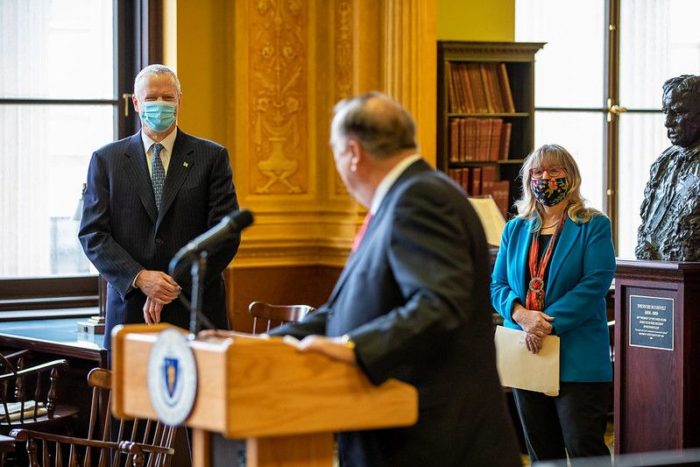
The measure sets the stage for a transformation of the state’s economy.
Culminating years of advocacy, disappointment, and negotiation, Gov. Charlie Baker finally signed the comprehensive “Next Generation Roadmap” climate bill at the end of last month, a bill which was originally passed by the legislature in early January.
The measure is the most significant climate bill passed in Massachusetts since the 2008 Global Warming Solutions Act and contains landmark environmental justice provisions, putting the first definition of an “environmental justice population” into law. The bill also requires Mass to cut greenhouse gas emissions to 50% of 1990 levels by 2030 and reach net zero emissions by 2050, establishing some of the most ambitious climate targets in the nation, similar to those in California and New York.
For Cabell Eames, the legislative manager of 350 Mass and a climate activist since the early 1990s, the bill is a major step forward. “We’ve kind of lagged a little bit in the last couple years to be honest,” said Eames. “We’ve passed some really mediocre climate bills. It was incrementalism with a capital ‘i’. We’ve just recently caught up.”
The bill’s signing on March 26 concluded its long, winding path to becoming law.
Despite its bipartisan support, Baker pocket-vetoed the bill at the end of the legislative session in January. The bill was quickly refiled with the exact same language and passed through the legislature, before Baker returned it with proposed amendments. The legislature eventually passed it again with changes on March 18, and Baker finally signed the next Friday.
“What I really appreciate about this is that people worked their way through and got to yes, and delivered a bill that, in many respects, continues to make Massachusetts a national leader on these issues,” Baker said at the ceremony for the bill’s signing.
Despite the bill’s convoluted path to becoming law, few significant changes were actually made to its original language. “If we were to have accepted all of Baker’s amendments, this bill would have been a lot weaker than it actually was,” Eames said. “I believe that the legislators really held the line and made sure that we got as strong of a climate bill passed as possible.”
A number of Baker’s other proposed amendments that were opposed by environmental justice and climate groups were rejected by the legislature, including a reduction of the state’s 2030 climate target and the elimination of legally binding targets for different sectors of the economy.
The final version of the bill did include a slight relaxation of the definition of green communities, an additional six months for the development of a specialized stretch energy code to which towns can opt in to increase their building energy standards, and various other technical and grammatical adjustments.
The changes also included stronger language protecting environmental justice populations, in response to amendments of Baker’s that were actually supported by a coalition of environmental organizations. Included in these changes was the addition of climate change to the definition of environmental burdens, and the assessment of cumulative impacts in certain permitting processes.
Already in this legislative session, an atypical number of climate bills have been filed, with environmental advocates looking to build upon the recently passed “Next Generation Roadmap.” One of these bills, “An act providing for building justice with jobs,” strives to retrofit “no fewer than 1,000,000 homes in Massachusetts” while providing living-wage jobs to workers. Notably, building consumption accounts for over 30% of Massachusetts emissions, according to the state’s most recent inventory.
Another bill, “An Act achieving a green future with infrastructure and workforce investments,” looks to create a “Green Infrastructure Fund” to make investments into public transit, electric vehicles and charging stations, and clean energy projects in rural communities, while striving to provide a living wage and union representation through the creation of a “Next Generation Green Workforce Fund.”
The link between jobs and climate legislation is currently a major focus of both advocates and legislators amidst a wave of climate progress in Massachusetts. While this recently-passed bill is no Green New Deal, it signifies a serious commitment in Massachusetts to climate justice, and sets the stage for a transformation of the state’s economy.
Jon is a freelance journalist and a senior at Colorado College. He oversees the school's student publications and covers environmental issues for the Catalyst newspaper. Sign up for his newsletter at newenglandclimate.substack.com.

